#dictatorships
Text
“It was December 1993, and I was sitting in my flat in Moscow, watching what must have been one of the first ever election night results shows on Russian television for a Parliamentary election.
It was an unusual spectacle, to say the least. Politicians, pundits and Russian officials were sitting around drinking champagne. And then this happened: On came an astrologer to deliver his celestial political forecast.
Looking back, it was quite appropriate really, because 30 years ago, Russians had stars in their eyes about freedom, democracy, and their country's future. That night, as well as electing a new parliament, the Duma, Russians also approved a new constitution. The constitution which, many years later, Vladimir Putin would change through a referendum to give himself the chance of twelve more years in power.
For a Russian election these days, you don't need astrologers or fortune tellers or crystal balls. I can tell you now pretty much what the result of next March's Russian presidential election will be. Vladimir Putin will win, and with a landslide.
There are several reasons for my confident prediction.
Russia's current political system is Putin's political system, his rules, his election. And although his will not be the only name on the ballot, his opponents are unlikely to include Mr. Putin's most vocal critics, arch rivals, and serious contenders. The president's most high profile opponents have either been poised, fled into exile or been put in prison. What's more, the Kremlin controls television. Vladimir Putin receives lots of airtime, and on tv, he's much praised, never criticized. Handy that, when you're seeking reelection.
And there's another reason he'll do well.
Meet Alexander. Alexander is a young tv reporter from northeastern Russia. At Vladimir Putin's end-of-year press conference recently, he stood up and declared, ‘We all support your decision to run in next year's election, because you've been in power for as long as I can remember.’ There are many Russians like Alexander who simply cannot imagine anyone else in the Kremlin, not because they idolize Vladimir Putin, they just see no alternative to him. I've often heard people here say, ‘Well, if not Putin, who then?’ The Kremlin has engineered that. It has cleared the political landscape of any potential challenges to the man who has ruled Russia as president or prime minister for nearly a quarter of a century, to make sure that those two words, that little question, ‘who then?’ is left unanswered.
Even the war in Ukraine and what are believed to be huge Russian military losses, don't appear to have sparked disillusionment in Russia's President and Commander-in-Chief.
It was Putin's decision to launch the full scale invasion, but some Russians believe that at a time of war, it is their duty to back their leader without questioning his motives or the consequences.
Crucially, the other thing you find a lot of here is indifference. Many Russians don't seem to care who's in power in the Kremlin. They just hunker down in their town or village and try to get through life as best they can. Indifference, too, benefits Vladimir Putin.
For all these reasons, his fifth election victory isn't in doubt.
But what I find much harder to predict is Russia's future. These are very dark times. Darkest, of course, for Ukraine, but for Russia, too. You can feel aggression in Russian society building. You can see repression growing, and you can see a leader who is determined, whatever the cost, to emerge from this war the winner.”
—Steve Rosenberg, BBC's Moscow correspondent, on Russia’s short lived democracy turned autocratic dictatorship
#politics#ukraine#russia#russian invasion of ukraine#vladimir putin#russia is a terrorist state#vladimir putin is a war criminal#authoritarian state#dictatorships#russian elections#russian election#dictators
91 notes
·
View notes
Text
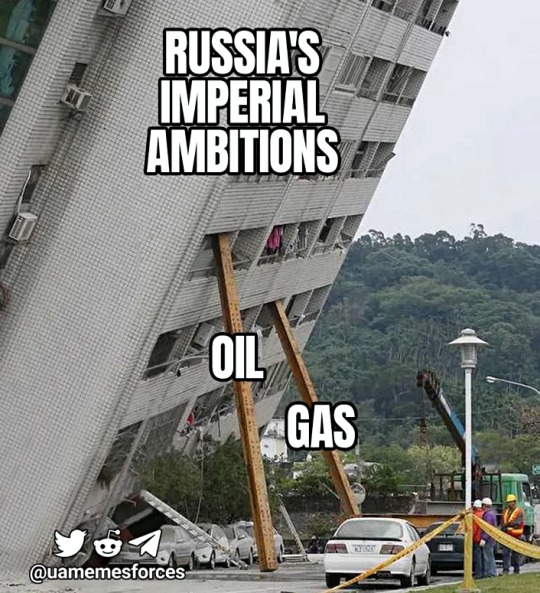
Russia and Iran are both terrorist states whose economies are propped up by fossil fuels.
If you'd like to see dictatorships and theocracies collapse, use less fossil fuel. Of course doing so is also helpful to the planet. 🌍
If I were an entrepreneur, I'd print up and sell stickers featuring pictures of Russian dictator Vladimir Putin and Iranian theocrat Ali Khamenei which people could place next to their thermostats and on their vehicle dashboards to remind them who is being empowered by oil and gas usage.
There is no downside to using less fossil fuel. Sustainable energy has a pro-democracy valence.
#russia#iran#dictatorships#fossil fuels#oil#gas#vladimir putin#ali khamenei#climate change#sustainable energy#stand with ukraine#invasion of ukraine#россия#владимир путин#путин хуйло#россия - террористическая страна#علی خامنه ای#خامنه ای دیک است#ایران#слава україні!#героям слава!
61 notes
·
View notes
Text
The road to freedom runs through Palestine
“The road to Jerusalem, it has so often been said, runs through Cairo. Writing from a regime prison cell in the months after Palestine’s ‘unity intifada’ of 2021, the Egyptian revolutionary Alaa Abd El-Fattah modified this historic injunction: ‘The road to Jerusalem looked like it ran through Cairo — but what is certain is that it must pass through Gaza. Jerusalem is not too proud to ask for Gaza’s help. Maybe Cairo should now show a little humility and do the same.’
“Here we have a lyrical articulation of a simple political truth: that the freedom struggle of the Palestinian people and the wider fight for democracy in the Arab world are one and the same. Only through the violent suppression of popular sovereignty across the region have the military dictatorships, the petro-monarchs, and the settler-colonial project in Palestine survived.
“As Alaa’s mediation suggests, this interconnected struggle is not one-way traffic, a matter of the Palestinians waiting for the Arab peoples to triumph over their autocratic rulers (American clients, more often than not). On the contrary, the Palestinian people often lead the way, generating space for struggle beyond the borders of their historic homeland, in places where the conditions of possibility for mass politics seem to have been crushed. Two weeks ago, it was a march in solidarity with the Palestinians of Gaza that saw Egyptian democrats surge back into Tahrir Square for the first time since the revolution ...
“From the West, action against the complicity of our governments has an indispensable role to play in the struggle to liberate Palestine. That is the most important thing, and the first purpose of an emerging mass movement. In Cairo two weeks ago, the chants quickly turned from Palestine to calls for ‘bread, freedom, and social justice.’ There are no such revolutionary horizons in Britain, but the significance of it being Palestine that offers us a glimpse of mass politics again cannot be overstated.
Not only the Egyptians: we, too, should be grateful to the Palestinian people. We stand with them, but it is the steadfastness of their popular struggle for universal freedom and dignity that shows the way.”
#from the river to the sea#palestine will be free#free gaza#free palestine#end the occupation#ceasefire now#solidarity with palestine#palestinian resitance#popular resistance#resistance#uprising#revolution#intifada#occupation of palestine#israeli apartheid#israeli war crimes#war crimes#palestine#egypt#dictatorships#arab world#settler colonialism#israel#middle east
32 notes
·
View notes
Text
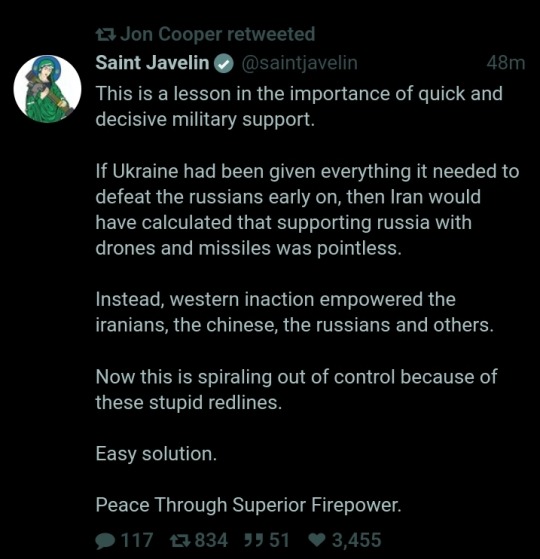
Honestly, all of this bullshit and chaos could've been easily avoided if other Western countries and certain leaders taken Russia stupid imperialist invasion of Ukraine way more seriously and been given Ukraine all of the weapons they needed to stop Russia. With damn Mike Johnson still blocking Ukrainian aid at this very highly-critical moment, this is what happens when you let Dictators and authoritarian regimes thinking that they can do whatever the hell they want with little to no consequences to their actions or when you try to appease to them in some way.
This is one of the mistakes and consequences of not stopping Russia sooner, because if there's is a possibility of Russia winning in Ukraine then that's a big signal to other authoritarian regimes being able to get away with invading and attacking other countries because they believe the West to be too weak or won't do anything in response to stop them.
#current events#politics#ukraine#iran#russia#war in ukraine#political#for real though#israel#russia invasion#you can't appease to fucking Dictatorships...#world issues#russian imperialism#fuck mike johnson#Iranian regime#russo ukrainian war#dictatorships#russian agression#russia is a terrorist state
12 notes
·
View notes
Text

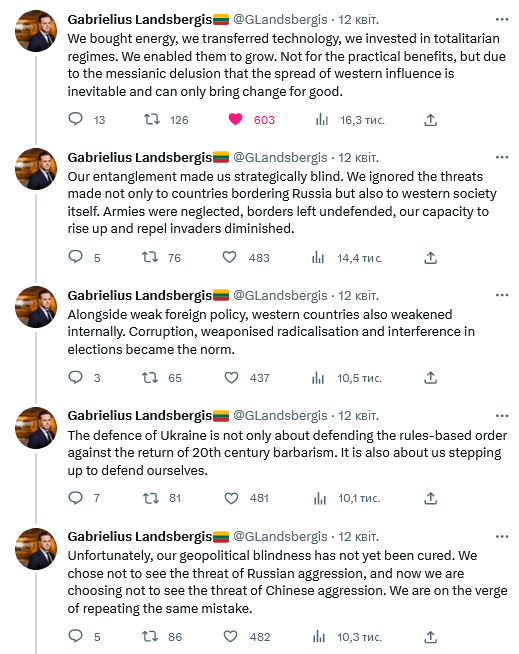

61 notes
·
View notes
Text

The Official Story (1985). During the final months of Argentinian Military Dictatorship in 1983, a high school teacher sets out to find out who the mother of her adopted daughter is.
Just utterly haunting. I'm going to be thinking about this one for a long time. 9/10.
#the official story#1985#Oscars 58#Nom: Original Screenplay#Nom: Foreign Film#Won: Foreign Film#luis puenzo#aida bortnik#norma aleandro#hector alterio#chunchuna villafane#argentina#argentinian#mother-daughter#dictatorships#aftermaths#9/10
15 notes
·
View notes
Text
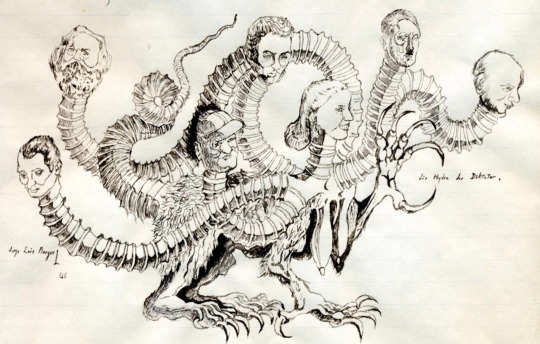
Dictatorships foster oppression, dictatorships foster servility, dictatorships promote cruelty; more abhorrent is the fact that they foster idiocy. Buttons babbling imperatives, effigies of caudillos, predetermined living and dying, walls adorned with names, unanimous ceremonies, mere discipline usurping the place of lucidity... Fighting those sad monotony is one of the writer's many duties. Will I have to remind readers of Martín Fierro and Don Segundo that individualism is an old Argentinian virtue?
Dictatorships foment oppression, dictatorships foster servility, dictatorships foster cruelty; but most abominable is the fact that they encourage idiocy. Buttons that babble imperatives, effigies of caudillos, pre-set alive and dead, walls exuberated by names, unanimous ceremonies, mere discipline usurping the place of lucidity ... To combat this sad monotony is one of the many duties of the writer. Will I have to remind readers of Martín Fierro and Don Segundo that individualism is an old Argentine virtue?
—Jorge Luis Borges, remarks to a gathering of Argentine writers ('Words spoken by Jorge Luis Borges in the food offered to him by the writers') in Aug, 1946. Below: The Hydra of Dictatorship, a pen-and-ink drawing by Jorge Luis Borges (1946)
(Robert Scott Horton)
8 notes
·
View notes
Text
The fact that Germany had produced a Beethoven, Russia a Tolstoy, Italy a Verdi, or Spain a Cervantes, was wholly irrelevant to the fact that all these countries experienced brutal dictatorships in the twentieth century. High cultural achievements across the centuries did not render a descent into political barbarism more inexplicable than their absence would have done; culture and politics simply do not impinge on each other in so simple and direct a manner. If the experience of the Third Reich teaches us anything, it is that a love of great music, great art and great literature does not provide people with any kind of moral or political immunization against violence, atrocity, or subservience to dictatorship.
Richard J. Evans’s The Coming of the Third Reich (2003)
13 notes
·
View notes
Text
You cannot understand history unless you understand its flowings, its currents and the ways leaders move within such forces. A leader tries to perpetuate the conditions which demand his leadership. Thus, the leader requires the outsider.
I caution you to examine my career with care. I am both leader and outsider. Do not make the mistake of assuming that I only created the Church which was the State. That was my function as leader and I had many historical models to use a pattern.
For a clue to my role as outsider, look at the arts of my time. The arts are barbaric. The favorite poetry? The Epic. The popular dramatic ideal? Heroism. Dances? Wildly abandoned. From Moneo's viewpoint, he is correct in describing this as dangerous. It stimulates the imagination. It makes people feel the lack of that which I have taken from them.
What did I take from them? The right to participate in history.
-The Stolen Journals (of God Emperor Leto II)
#dune#god emperor of dune#religion#politics#tyranny#dictatorships#god#emperor#giant worm#sand worm#would you still love me if I was a worm#wormblr#shai hulud#the spice#the spice melange#dickless worm#philosophy#sci-fi#fantasy
3 notes
·
View notes
Text
The US’s favorite thing is to fuck with and destabilize other countries governments so are we really surprised that a nation where a MAJORITY of Nazi high ranking officers fled to at the end of WW2 was able to cause an insurrection
#us politics#brazil politics#brazil news#fascism#dictators#dictatorships#politics#democracy#brazil insurrection
13 notes
·
View notes
Text
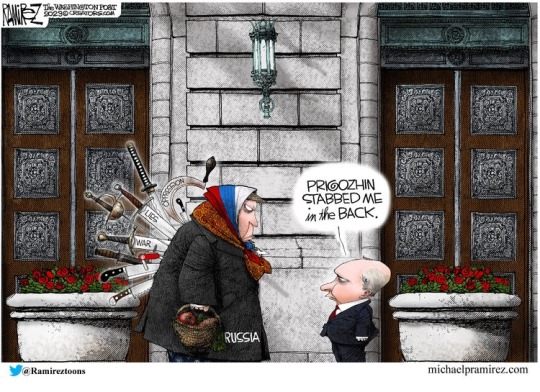
3 notes
·
View notes
Text
Fossil fuels are not just terrible for the planet, they are bad for democracy. A disproportionate number of major oil and gas exporters are autocracies such as Russia, Iran, Saudi Arabia, and Venezuela.
Russia in particular uses fossil fuel sales to fund repression at home and imperialism abroad.
Putin appears weaker than ever – and for a ruler who relies on projecting strength, that’s a bad look. To further dull Putin’s fading aura of invincibility, and to ultimately lead to a reversal of Russia’s invasion of Ukraine, we need to undermine the pillars his strongman myth is based on: colonial conquest, unregulated capitalism and climate abuse. As questions are raised about his ability to rule, Putin will claim that despite the efforts of the nefarious “collective west”, the Russian economy can stabilise because the world needs Russian fossil fuels; that the need of western companies to make money in Russia means it will never be truly isolated; that for all his blunders on the battlefield, he can still hold on to swathes of Ukraine and its resources, which he will dole out between the Russian system’s stakeholders for whom the risk of sticking with Putin will thus still be smaller than the risk of going against him.
No matter what the source of the oil or gas we consume, we push up the international price of those commodities whenever we use them. It's supply and demand; when we reduce our demand, the price goes down and dictators/theocrats get lower profits.
We need to recognise the fact that human rights, security and economic ties are deeply intertwined, and to alter our behaviour accordingly. Let’s stop selling dictators the rope with which they hang people: our neighbours – and ultimately us. And if there’s one base element that powers Putin’s claims to invincibility, it’s reliance on fossil fuels. The battle against Putin is also the battle against climate crisis. As Prof Alexander Etkind lays out in his new book, Russia Against Modernity, Putin’s economy has been up to two-thirds dependent on oil and gas exports, largely to Europe, and crucially through pipelines that cross Ukraine.
Etkind argues that Putin launched his invasion in part to control this flow. Moreover, he wanted to destabilise Europe, flooding it with refugees and instilling so much chaos and fear that Europe would be forced to abandon plans for net zero carbon emissions by 2050. As so often in the course of this war, Putin’s aims have backfired. The invasion has led to a decrease in dependence on Russian energy. Putin’s aura of fossil-fuelled invincibility has been shaken, but we are only part of the way there. Faster decarbonisation is the most sustainable way to not only undermine Putin, but also to limit the opportunity for future Russian leaders and other resource-rich authoritarians to wage aggressive wars.
Decarbonization is also de-Putinization. We contribute to peace and stability when we lessen the amount of fossil fuels we consume. And, of course, we slow down and eventually halt the warming of our planet.
Using these late 19th century sources of energy encourages despotic autocracies while making Earth less livable. It's time to say до свидания to fossil fuels.
#fossil fuels#climate change#invasion of ukraine#dictatorships#autocracies#theocracies#russia#vladimir putin#decarbonization#net zero#peter pomerantsev#alexander etkind#human rights#stability#россия#владимир путин#путин хуйло#диктатура#самодержавие#ископаемое топливо#изменение климата#союз постсоветских клептократических ватников#руки прочь от украины!#геть з україни#вторгнення оркостану в україну#україна переможе#слава україн��!#героям слава!
13 notes
·
View notes
Link
Our Nazi secret
#NATO#Nazi#stay behinds#deception#strategy of tension#CIA#days of lead#Gladio#dictatorships#assassination#terrorism#history
2 notes
·
View notes
Text

For wathever reason, I wasn’t able to reblog @urban-cryptid ‘s post, so I took a screenshot.
@urban-cryptid please name one communist country that didn’t end up turning into a dictatorship. I am genuinely curious.
1 note
·
View note
Text
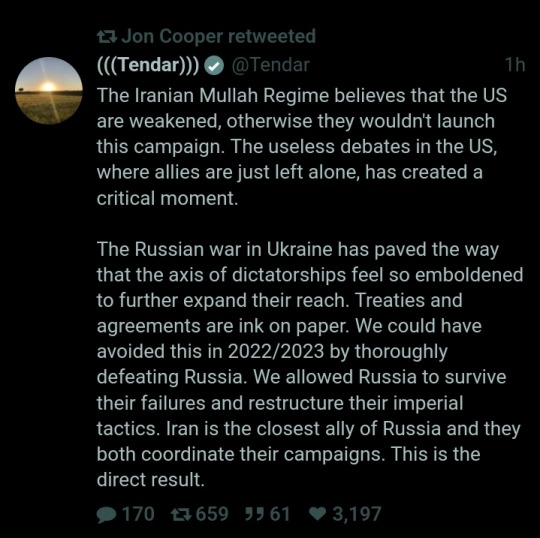
#current events#Iranian regime#politics#political#russo ukrainian war#war in ukraine#ukraine#israel#iran#russia#This is what happens when you try to appease Dictatorships....#world issues#All of this could've easily been avoided if Russia was fully stopped by now.#dictatorships#us politics
13 notes
·
View notes
Text
Of the 19 hijackers who carried out the Sept 11 attacks:
15 were from Saudi Arabia (a powerful/oil-rich country the U.S. works hard to maintain diplomatic relations with)
2 were from the United Arab Emirates (also a powerful/oil-rich country the U.S. works hard to maintain diplomatic relations with)
1 was from Egypt, 1 from Lebanon.
None of the hijackers were from Iraq.
None of the Sept 11 hijackers were Iraqi.
None of the 9/11 hijackers were from Iraq.
#9/11#serious post#not a shitpost#this should be one of the first things kids learn when they learn about the 9/11 attacks#politics#this is just...it's such an essential and brazen fact and i rarely see basic outrage over it#i want outrage. i want fury. i want disgust over the way fundamental facts are disguised and discarded and downplayed#because there are things we should KNOW. basic fact we should ALL KNOW. and they are tucked away in the footnotes.#and no this is NOT to put the blame on other middle eastern countries#we know this was carried out by a specific terrorist organization not a national government#but King George the Second decided (and was encouraged by his cabinet!) to invade a nation!#a nation that was not at all related or responsible!!!#a dictatorship to be sure--but a dictatorship that King George the First had been happy to support#so what changed? why did we go in guns blazing to DEMOLISH a country *we had NO PLANS OF REPAIRING*???#well. because they wanted a villain didn't they. a nice clean war. clarity of purpose. us the heroes against them the villains#and when you're in that mindframe--truth is irrelevant. you can pick your villain (your victim) by rolling a roulette wheel#truth is irrelevant#worse: to the people in charge#truth is a HINDRANCE#'Alternative facts' existed long before it became a catchphrase#facts don't matter. truth doesn't matter. the impulses of a handful of volatile & rich & power-high people--that's History. congratulations
32K notes
·
View notes